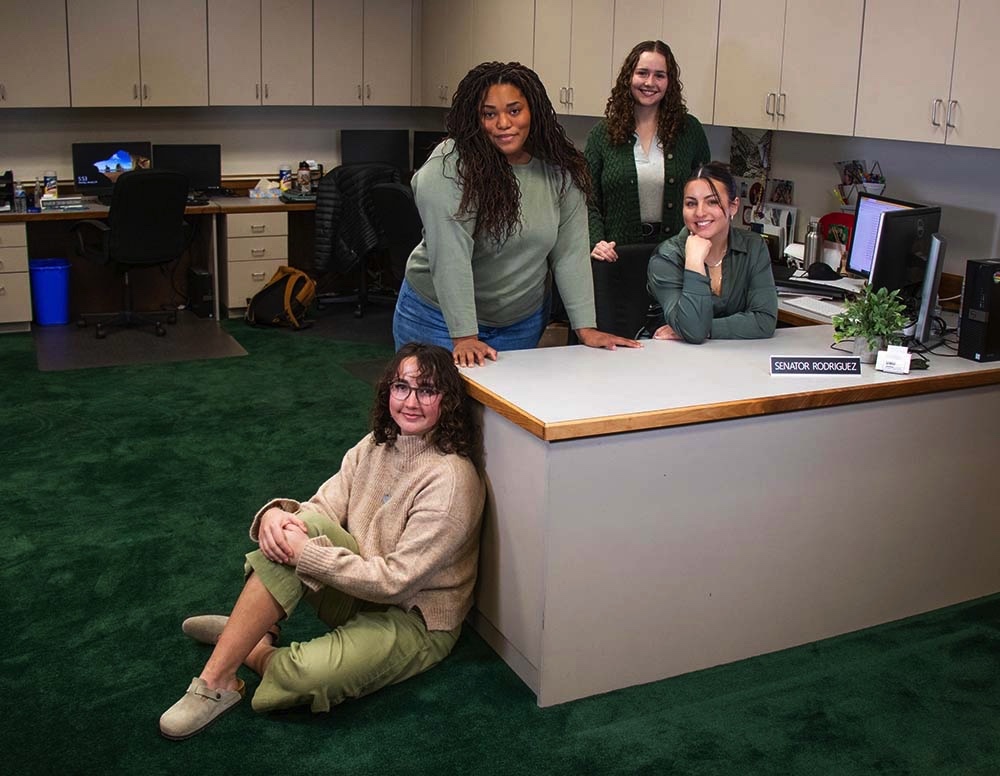USUSA officers call on USU to better support women
On Jan. 14, The Salt Lake Tribune published a commentary written by four officers of the Utah State University Student Association calling on Utah State University to provide better support to women, especially those who have experienced sexual assault.
“Although our university’s student population is currently 55% womxn, the lack of representation, advocacy and action for us is blatantly apparent,” they wrote.
The commentary was written by College of Natural Resources Senator Meridian Wappett, College of Humanities and Social Sciences Senator Celeste Rodriguez, College of Education and Human Services Senator Chloe Christopher, and Organizations and Campus Diversity Vice President Emilee Harmon.
“A large purpose of this was to let all women within the university know that they’re being heard,” Rodriguez said, “and know that there are student leaders and women out there that are looking out for them and their needs and that are willing to do whatever it takes to ensure that they feel safe.”
Harmon said the officers wanted to be part of a culture change and, as student leaders and women, they felt like they needed to take a stance.
“I think it’s important to realize this entire thing that’s going on didn’t happen in an echo chamber, and this happens at probably every college campus across the country,” Harmon said. “I think it was just really important for us to call out bad behavior when we saw it.”
On the day the commentary was published, the four officers met with USU President Noelle Cockett, as well as Hilary Renshaw from the Office of Equity and Jenny Erazo from the Sexual Assault and Anti-Violence Information Office, or SAVVI.
“We focused mostly on why they thought the U niversity was not adequately responding to sexual assault on campus,” Cockett said in an email. “The biggest issue seems to be that students don’t have ready access to reports and processes on how the Equity Office handles reports, cases and investigations.”
Cockett said the group discussed using social media to educate students about the Office of Equity and creating a “strategic plan” to improve the university’s culture surrounding sexual assault.
Christopher said she thought the meeting was “very successful.”
“We kind of went into it not knowing what was going to happen, so we kind of talked about how it is an ongoing process,” Christopher said. “It’s not going to just be solved overnight.”
Rodriguez said the meeting was beneficial because the Office of Equity and SAAVI do not have as many student representatives.
“They truly don’t know what the students need,” Rodriguez said. “It was really beneficial, giving a perspective that we do know, we have heard, and we can amplify what we have heard to these other people within the university.”
In the commentary, the officers said they were “investigating and pursuing legislative action” within USUSA to better protect women. However, this meeting changed their plans.
“We have realized that our legislation at the USUSA basis is not really as impactful as we would hope it to be,” Wappett said. “It has to be more of a university culture change.”
Three of the officers — Harmon, Rodriguez and Wappett — were also sponsors of two identical resolutions that encourage faculty and staff to use diversity, equity and inclusion , or DEI, training.
“What that training looks like would be up to the discretion of the new position that’s being created this summer, which is the DEI vice president,” Rodriguez said, “but its primary purpose is just to be a toolkit for these members of the university to just understand more about the needs of all minority students within the university.”
The USUSA Academic Senate and USUSA Executive Council both unanimously passed these resolutions — Academic Senate Resolution 2022-01 and Executive Council Resolution 2022-02 — on Jan. 10 and Jan. 11 respectively. It was approved by the Stater’s Council on Tuesday.
With the 2022 USUSA elections in February, both Christopher and Wappett emphasized the importance of researching candidates and voting for individuals who will continue to stand up for students.
“Do your research,” Wappett said. “There’s candidates who are going to continue to fight this good fight after we’re gone. There’s candidates that aren’t. So make sure you’re knowledgeable going into your elections.”
-Darcy.Ritchie@usu.edu

